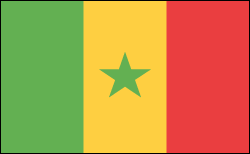Senegal History


A Smooth Transition of Power
When the economy continued to stagnate, and with it Senghor's popularity, he resigned after 20 years at the helm in favor of his protégé, Abdou Diouf. Diouf, who led the country for the next 20 years, initiated further economic and political liberalization, including the sale of government companies and permitting the existence of political parties. In March 2000, opposition party challenger Abdoulaye Wade won 60% of the vote in multiparty elections. Diouf stepped aside in what was hailed as a rare smooth transition of power in Africa. In Jan. 2001, the Senegalese voted in a new constitution that legalized opposition parties and granted women equal property rights with men.
In Sept. 2002, 1,863 passengers were killed when the state-owned Joola ferry sank. The government accepted responsibility for the disaster.
The president removed Prime Minister Idrissa Seck in April 2004. Seck was considered Wade's rival. Wade was elected to a second term in February, taking about 56% of the vote—enough to avoid a runoff election. Seck placed second, with about 15%. Wade did not breeze to victory, however, as his opponents accused him of corruption and the electorate has grown impatient with the slow growth in the number of jobs.







